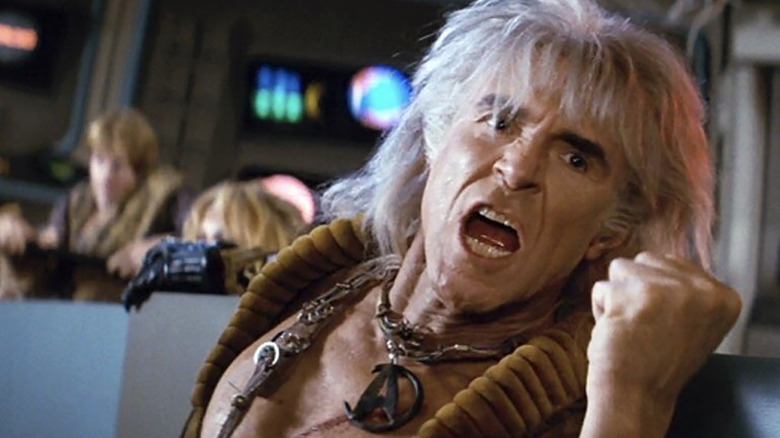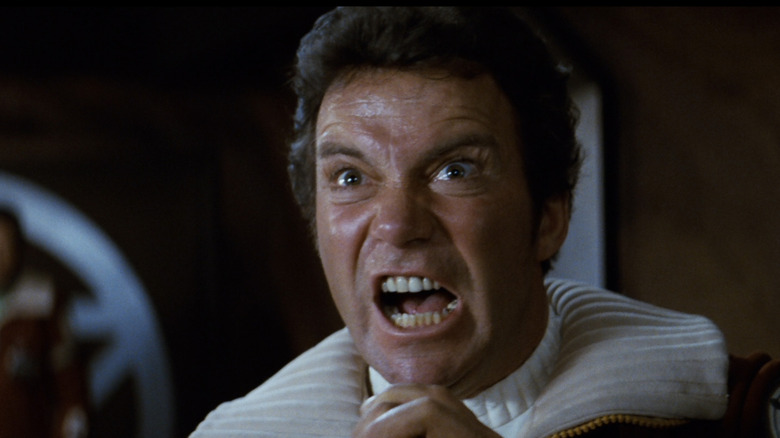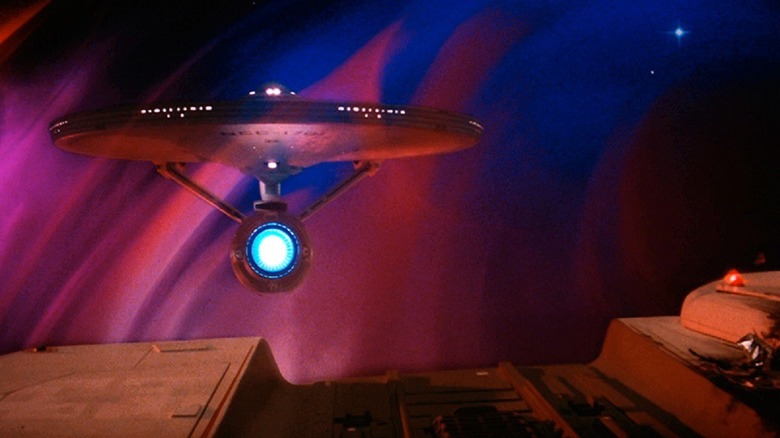Star Trek II: The Wrath Of Khan's Behind-The-Scenes Challenges Included Toxic Memos From Gene Roddenberry
French philosopher Roland Barthes' 1967 essay "The Death of the Author" argues the literary theory of separating the meaning of a work from the author's intention, essentially allowing for a reader's personal interpretation to supersede it. Given the plethora of disparate voices seen today, made up of professional critics as well as average audience members, this theory has generally become widely accepted, at least within reason. It's a much easier thing to do when it comes to television and film, given the fact that, auteur theory aside, these are artistic mediums brought to life by dozens or hundreds of people, and not just one.
Yet pushing past the clearly stated intentions of the originator of a work can be daunting, especially when that creator seems to change their mind about what those intentions are over time. This is exactly the situation that Nicholas Meyer, Harve Bennett, and the rest of the people who crafted "Star Trek II: The Wrath of Khan" found themselves in with "Star Trek" creator Gene Roddenberry while making their film in the early 1980s. Although the Roddenberry of the original "Star Trek" TV series may have been perfectly fine with what Meyer and Bennett wanted to do with the film, the Roddenberry post-"Star Trek: The Motion Picture" was a different man, and had grown to believe that "Star Trek" should be trekking in a different direction than where it was going with others at the helm.
In short, he believed it should've been going his way. Years before he eventually succeeded in getting the franchise to follow his direction with the birth of "Star Trek: The Next Generation," Roddenberry had some choice words for the creatives in charge of "Khan," and as Meyer recently revealed, they weren't particularly nice words.
Meyer 'blacked out' Roddenberry's vitriolic memos to him
By all accounts, the making of "The Wrath of Khan" was not the smooth sailing experience one might hope for (although, when compared to the grief involved in making "The Motion Picture," perhaps it seems rosy). In a recent interview with TrekMovie, Meyer recalled how he had to write a shooting script for the film in just 12 days to keep everything on schedule (especially the visual effects work from ILM) and make the already-planned release date of June 4, 1982. After "shooting in the day and editing all night," as he described it, the final cut of "The Wrath of Khan" just barely made it to the finish line intact. That it was any good, let alone the best "Star Trek" movie ever made, is nothing short of a minor miracle.
Given this tumultuous schedule, it's no surprise that Meyer's memory of everything that went down while making the film is hazy some 42 years later. It seems that the film's generally positive reception and hugely influential legacy have allowed Meyer to mostly remember all the good aspects of making the movie, especially how ecstatic many audiences were upon seeing the film for the first time. What Meyer didn't recall until this interview was that he'd had a bitter feud with Roddenberry during the film, albeit one that seemed to play out wholly in memos:
"...people asked me for years what was my interaction with Gene Roddenberry. And I said, well, you met him. You had to shake his hand and so forth, but he wasn't part of making the movie, which was certainly true. But when I went back to my alma mater, the University of Iowa in Iowa City, I went to the library where they have all my papers, and I was stunned to see an exchange of memoranda between me and Gene Roddenberry that I had totally blocked out. Once I read them, I understand why I blocked them. It was very toxic, very venomous. He hated the script. I guess I didn't know any better, so I was intemperate. I responded intemperately. And I had just blocked all memory of this."
How Wrath of Khan gave Star Trek fans what they needed, not what they wanted
A breakdown of exactly why Roddenberry was so upset over the script for "The Wrath of Khan" can be found in this piece by /Film's Witney Seibold, suffice to say that Roddenberry wasn't pleased with the more adventure-oriented direction the film went in. As I mentioned earlier, this would likely not have been a problem for Roddenberry during the making of the TV series, and for a couple of reasons. For one, numerous episodes of the show were very adventure-oriented, including "Balance of Terror," which, like "Wrath of Khan," was directly inspired by 1957's "The Enemy Below." For another, Roddenberry hadn't yet fallen under the influence of the massive throng of Trekkers (Trekkies if you're nasty), "Star Trek" fans and their groups who were an influential part of keeping the series on the air and bringing it back to life.
We know now, in 2024, how damaging fandoms can be to art and culture; if nothing else, they're a sterling example of why art should never be made by committee. Back in the '70s and '80s, however, they were a relatively new influence, demonstrating to studios and creators alike how they could help make or break a franchise. With all the discussions Roddenberry had with these fans, he began to get the notion that "Star Trek" should distinguish itself from genre traditions, using its built-in concept of a utopian, progressive future society to further ideas of conflict avoidance, diplomacy, collaboration between groups, and so on. These are all noble goals, but they don't easily make for good drama. While Roddenberry's vision of a new "Star Trek" would eventually become better honed, allowing for the franchise to thrive to this day, it had some growing pains, felt most keenly during the making of "The Motion Picture" and "Khan."
What Meyer, Bennett, and the rest of the makers of "Khan" were doing was following some of the core tenets of drama, making creative decisions that only sounded potentially dissatisfying on paper but, when executed on the level of greatness (as they ended up being), turned out fantastic. Chief among these decisions was the death of Spock (Leonard Nimoy), a choice that Roddenberry tried to stoke the fires of fandom against, but which proved to be an iconic moment in "Star Trek" and film history. What the lesson of "Death of the Author" really is doesn't involve a "right" or a "wrong" interpretation of a work. Instead, it's about freeing oneself from objectivity in art: you never know for sure until you try it for yourself.


